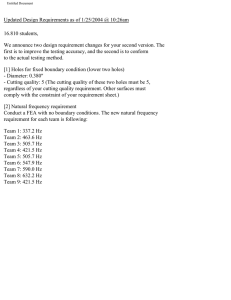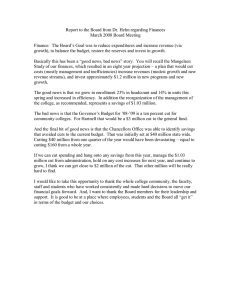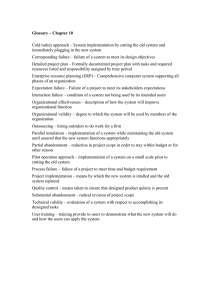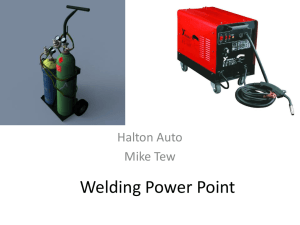AG MECH NAME_______________ OXY FUEL TORCH CUTTING
advertisement
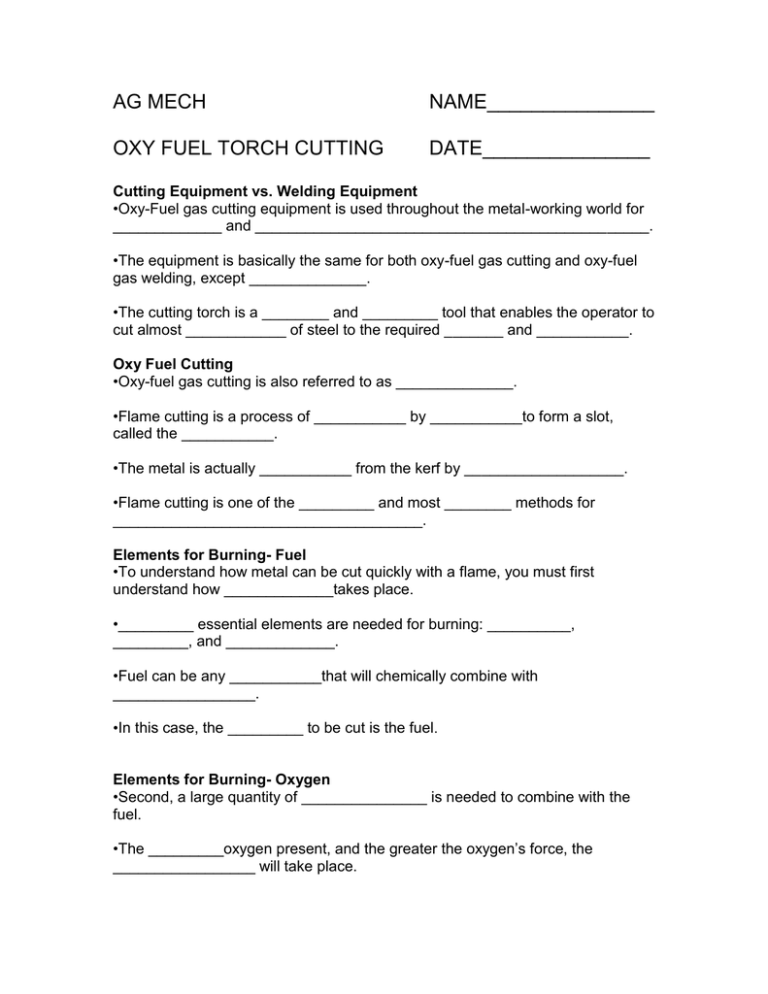
AG MECH NAME_______________ OXY FUEL TORCH CUTTING DATE_______________ Cutting Equipment vs. Welding Equipment •Oxy-Fuel gas cutting equipment is used throughout the metal-working world for _____________ and _______________________________________________. •The equipment is basically the same for both oxy-fuel gas cutting and oxy-fuel gas welding, except ______________. •The cutting torch is a ________ and _________ tool that enables the operator to cut almost ____________ of steel to the required _______ and ___________. Oxy Fuel Cutting •Oxy-fuel gas cutting is also referred to as ______________. •Flame cutting is a process of ___________ by ___________to form a slot, called the ___________. •The metal is actually ___________ from the kerf by ___________________. •Flame cutting is one of the _________ and most ________ methods for _____________________________________. Elements for Burning- Fuel •To understand how metal can be cut quickly with a flame, you must first understand how _____________takes place. •_________ essential elements are needed for burning: __________, _________, and _____________. •Fuel can be any ___________that will chemically combine with _________________. •In this case, the _________ to be cut is the fuel. Elements for Burning- Oxygen •Second, a large quantity of _______________ is needed to combine with the fuel. •The _________oxygen present, and the greater the oxygen’s force, the _________________ will take place. •Therefore, _____________ requires a ____________ of pure oxygen directed onto the steel. Elements for Burning- Heat •Third, ________is needed to raise the _______________ _________ until it reaches its ___________- temperature. •__________________ is the temperature at which the material will burn when oxygen is present. •The ignition or kindling temperature of steel is ___________ Fahrenheit. •At this temperature, steel turns __________________. •The ____________________ is directed onto the hot metal. •The steel burns ________, and a slot is cut through the entire piece. •The oxygen and hot steel are actually combining to form a chemical reaction called _____________________. Flame Cutting- How it Works •The Oxy-Fuel cutting process is accomplished by ___________________________________, then introducing a high-pressure stream of _________________. •This will ______________ the metal as well as carry away the ____________________________ residue. •Oxy-fuel cutting can be applied to _________________, __________________ and ________________________. •_____________, ______________ and ___________ are not usually cut using oxy-fuel equipment. Importance of Torch Cutting •More people use the ______________ than any other welding process. •The cutting torch is used by workers in virtually _____areas including manufacturing, maintenance, automotive repair, railroad, farming, and more. •It is unfortunately one of the most commonly ___________ _______________. •Most workers know how to _____________ and make a cut, but their cuts are very _________ and often _________. •A good _____________ should not only be __________and ___________, but it should require ____________________ cleanup. •Excessive post-cutting cleanup results in _________, which is an expense that cannot be justified. Getting Started- Inspect the Equipment The Torch Inspect the _________, _________, and ___________ for _________, ___________, ________, ________, or ____________. Dirt and dust can be removed with a _________________. •CAUTION: If oil, grease or damaged parts are detected, _________________ Report it to the instructor immediately! The "O" Rings Inspect the ____________________________ for missing or damaged __________. Damaged or missing “O” rings can allow gases to mix and will cause ______________ or _____________. The Cutting Tips Inspect the _________. The tapered seating surfaces must be in ___________ condition. •If _______, __________ or _________ are present, the seat must be ________________. •If the torch is used with a bad seat, ____________ or _______________ may occur. Setting Up the Cutting Head ____________ the cutting attachment to the ___________ handle and tighten the coupling nut, ___________________. •________________ may damage “O” rings and create a faulty seal. Tip Selection Select the required _________ and _________ of cutting tip. Attaching the Cutting Tip Insert the _______ in the _____________ and tighten securely with an ______________________. Cutting Tip Chart Refer to a ________________________ for correct cutting tip, regulator pressures, and travel speed. Lighting The Torch Open the ______________ on the welding torch all the way. Adjust the _______________ to the desired delivery pressure. •DO NOT EXCEED __________ Adjust the ________________________ delivery pressure. •DO NOT EXCEED _____________ Open the fuel valve on the __________ approximately ________________and ignite the gas with a ____________. •NOTE- Wear protective goggles or glasses ___________to shield the eyes from the bright light of the flame and leather gloves from ___________________ when lighting the torch. Continue to ___________ the fuel supply at the __________ __________ until the flame clears the end of the tip about __________, then reduce the supply slightly to return the flame to the tip. __________ open the ____________________ on the cutting attachment until the preheat flames establish a _________________________________. Depress the ___________________________________. •Note- if the preheat flame changes slightly to a __________ __________, continue to ____________________________ _________________________ at the cutting attachment until the preheat flames are ____________________ again. Torch Cutting Precautions •IMPORTANT: Check where ___________ and ___________ will fall. •Have _____________ available, remove flammable substances, and check where the ______________ are located before starting to work. •Protective ______________ and _________should be worn while torch cutting. Straight Line Cutting Hold the cutting attachment or torch comfortably _________ __________ so one hand stabilizes the ___________. Preheat flames approximately _______ from ____________ and the other hand is free ___________________________. Direct the preheat flame on the spot where the ___________ _____________. •Before cutting action can start, the base metal must be ______________________________________________. •When the ____________ appears, __________ the cutting oxygen lever ________________. When the cut has started, ________________ in the direction you wish to cut. •Note: moving too _________ will allow the cut or kerf to ___________, and moving __________ will not allow the metal to be preheated and the cut ___________________. Continue to depress the cutting oxygen lever past the final edge of the base metal for a good “________________.” Recommended Procedure for Flame Cutting of Thick Metal 1.Start to preheat; point tip at angle on edge of plate. 2.Rotate flame back to upright position – keep the dark inner blue flame 1/8” from metal. 3.Press oxy valve slowly; as cut starts, rotate tip backward slightly. 4.Now rotate to upright position without moving tip forward. 5.Rotate tip more - so tip points slightly in direction of cut. 6.Advance as fast as good cutting action will permit. 7.Do not jerk; maintain slight leading angle toward cut direction 8.Slow down; let cutting stream sever corner edge at bottom. 9.Continue steady forward motion until tip has cleared end. Torch Cutting- Piercing a Hole To pierce metal, again hold the cutting attachment or torch comfortably in both hands with one hand stabilizing the cutting tip preheat flames approximately _________ from the base metal while the other hand is free to depress the ________________________. To prevent the _________and __________from blowing towards you, _________the torch tip slightly to one side when the oxygen is depressed. When the metal is pierced, move the torch __________ in the direction you wish to cut. •Note- If the metal is not pieced all the way through it probably means that ______________________________ _______________________________________________. •NOTE- If the cut piece does not fall off at the end of a cut, DO NOT ________________________. •Simply _____ the cut piece of metal with a _____________ and the piece will generally detach. Shutting Down the Cutting Outfit •After the cutting operation ________, or whenever the cutting torch operator ______________, the oxy-acetylene cutting outfit must be _____________________________. Follow these procedures for shutting down the equipment: Step 1 1.Turn off the ___________________________________. 2.Turn off the ____________________________________. 3.Turn off the ____________________________________. 4.Turn off the ____________________________________. 5.Reopen the _________________ and depress the ___________________________ to release or bleed any gas still remaining in the hoses. 6.When the regulators read ___________ - shut off the _____________________________________________. 7.Turn the ____________ and ____________regulator _______________________________________________. 8.____________ the Oxy-acetylene hoses on the outfit for proper clean-up and shop organization.
